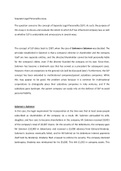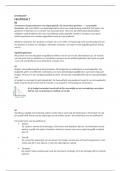Separate Legal Personality essay
The question concerns the concept of Separate Legal Personality (SLP). As such, the purpose of
this essay is to discuss and evaluate the extent to which SLP has influenced company law, as well
as whether SLP is undesirable and unnecessary in several ways.
The concept of SLP dates back to 1987, when the case of Salomon v Salomon was decided. The
principle established in Salomon is that a company's director or shareholder and the company
itself are two separate entities, and the director/shareholder cannot be held personally liable
for the company's debts, even if the director founded the company on his own. Since then,
Salomon has become a landmark case that has served as a precedent for subsequent cases.
However, there are exceptions to the general rule (will be discussed later). Furthermore, the SLP
concept has been extended to multinational companies/parent subsidiary companies. While
this may appear to be good, the problem arises because it is common for multinational
corporations to strategically place their subsidiary companies in risky ventures, and if the
subsidiary goes bankrupt, the parent company can easily rely on the defence of SLP to avoid
personal liability.
Salomon v Salomon
In this case, the legal requirement for incorporation at the time was that at least seven people
subscribed as shareholders of the company. As a result, Mr. Salomon persuaded his wife,
daughter, and four sons to become shareholders in the company. Mr Salomon received 20,001
of the company's total of 20,007 shares. On the security of the debentures, the company gave
Mr Salomon £10,000 in debentures and received a £5,000 advance from Edmund Broderip.
Salomon's business eventually failed, and he fell behind on his debenture interest payments
(half held by Broderip). Broderip filed a lawsuit to enforce his security. The company declared
bankruptcy. Broderip was reimbursed for his $5,000. This left £1,055 in company assets. This
, sum was claimed by Salomon through his retained debentures. Unsecured creditors would be
left with nothing. The liquidator of the company argued that Salomon should be held liable for
the company's debts. Salomon filed a £1,055 lawsuit. The Court of Appeal ruled in favour of the
creditors, holding that a company's director acts as a "agent" of the company. This means that
the director makes decisions on the company's behalf. As a result, the corporate veil should be
lifted, making the director, Mr.Salomon, personally liable. However, this decision was
overturned in the House of Lords (HOL). The HOL determined that the company and the
director are two distinct entities. As a result, liquidators cannot sue the director if the amount
received after liquidation is insufficient. As a result, Mr.Salomon was not personally liable for his
company's debts.
As previously stated, the general rule of SLP includes exceptions. In cases involving fraud, Single
Economic Entity, and the Interest of Justice, the courts are willing to lift the corporate veil
(directors/shareholders of a company are liable for the company's debts). This is to ensure that
a company's directors or shareholders do not abuse limited liability. Gilford Motors v Horne
involved the use of the fraud exception. In this case, a former employee agreed with the
company that he would not steal its customers. However, he later formed his own company and
drew customers from the former company. When action was taken against him, he invoked the
defence of separate legal personality, but this was rejected by the courts and dubbed a "sham
devise" or a "mere facade." Furthermore, Daimler Co Ltd v Continental Tyre & Rubber Co is an
exception to the general rule in cases of interest of justice. In this case, the shareholders were
German, and the courts determined that the company was an enemy during the war. The
German shareholders were spies disguised as a company, and thus the company was created as
a front. As a result, because the shareholders were German, Mr. Daimler was not required to
pay for the Continental tires. The HOL believed that if a natural person can be malicious, so can
a corporation. The corporate veil is lifted, as trading with the enemy was illegal during the war.
Furthermore, in DHN Food Distributors v Tower Hamlets, it was established that the veil of
The question concerns the concept of Separate Legal Personality (SLP). As such, the purpose of
this essay is to discuss and evaluate the extent to which SLP has influenced company law, as well
as whether SLP is undesirable and unnecessary in several ways.
The concept of SLP dates back to 1987, when the case of Salomon v Salomon was decided. The
principle established in Salomon is that a company's director or shareholder and the company
itself are two separate entities, and the director/shareholder cannot be held personally liable
for the company's debts, even if the director founded the company on his own. Since then,
Salomon has become a landmark case that has served as a precedent for subsequent cases.
However, there are exceptions to the general rule (will be discussed later). Furthermore, the SLP
concept has been extended to multinational companies/parent subsidiary companies. While
this may appear to be good, the problem arises because it is common for multinational
corporations to strategically place their subsidiary companies in risky ventures, and if the
subsidiary goes bankrupt, the parent company can easily rely on the defence of SLP to avoid
personal liability.
Salomon v Salomon
In this case, the legal requirement for incorporation at the time was that at least seven people
subscribed as shareholders of the company. As a result, Mr. Salomon persuaded his wife,
daughter, and four sons to become shareholders in the company. Mr Salomon received 20,001
of the company's total of 20,007 shares. On the security of the debentures, the company gave
Mr Salomon £10,000 in debentures and received a £5,000 advance from Edmund Broderip.
Salomon's business eventually failed, and he fell behind on his debenture interest payments
(half held by Broderip). Broderip filed a lawsuit to enforce his security. The company declared
bankruptcy. Broderip was reimbursed for his $5,000. This left £1,055 in company assets. This
, sum was claimed by Salomon through his retained debentures. Unsecured creditors would be
left with nothing. The liquidator of the company argued that Salomon should be held liable for
the company's debts. Salomon filed a £1,055 lawsuit. The Court of Appeal ruled in favour of the
creditors, holding that a company's director acts as a "agent" of the company. This means that
the director makes decisions on the company's behalf. As a result, the corporate veil should be
lifted, making the director, Mr.Salomon, personally liable. However, this decision was
overturned in the House of Lords (HOL). The HOL determined that the company and the
director are two distinct entities. As a result, liquidators cannot sue the director if the amount
received after liquidation is insufficient. As a result, Mr.Salomon was not personally liable for his
company's debts.
As previously stated, the general rule of SLP includes exceptions. In cases involving fraud, Single
Economic Entity, and the Interest of Justice, the courts are willing to lift the corporate veil
(directors/shareholders of a company are liable for the company's debts). This is to ensure that
a company's directors or shareholders do not abuse limited liability. Gilford Motors v Horne
involved the use of the fraud exception. In this case, a former employee agreed with the
company that he would not steal its customers. However, he later formed his own company and
drew customers from the former company. When action was taken against him, he invoked the
defence of separate legal personality, but this was rejected by the courts and dubbed a "sham
devise" or a "mere facade." Furthermore, Daimler Co Ltd v Continental Tyre & Rubber Co is an
exception to the general rule in cases of interest of justice. In this case, the shareholders were
German, and the courts determined that the company was an enemy during the war. The
German shareholders were spies disguised as a company, and thus the company was created as
a front. As a result, because the shareholders were German, Mr. Daimler was not required to
pay for the Continental tires. The HOL believed that if a natural person can be malicious, so can
a corporation. The corporate veil is lifted, as trading with the enemy was illegal during the war.
Furthermore, in DHN Food Distributors v Tower Hamlets, it was established that the veil of



